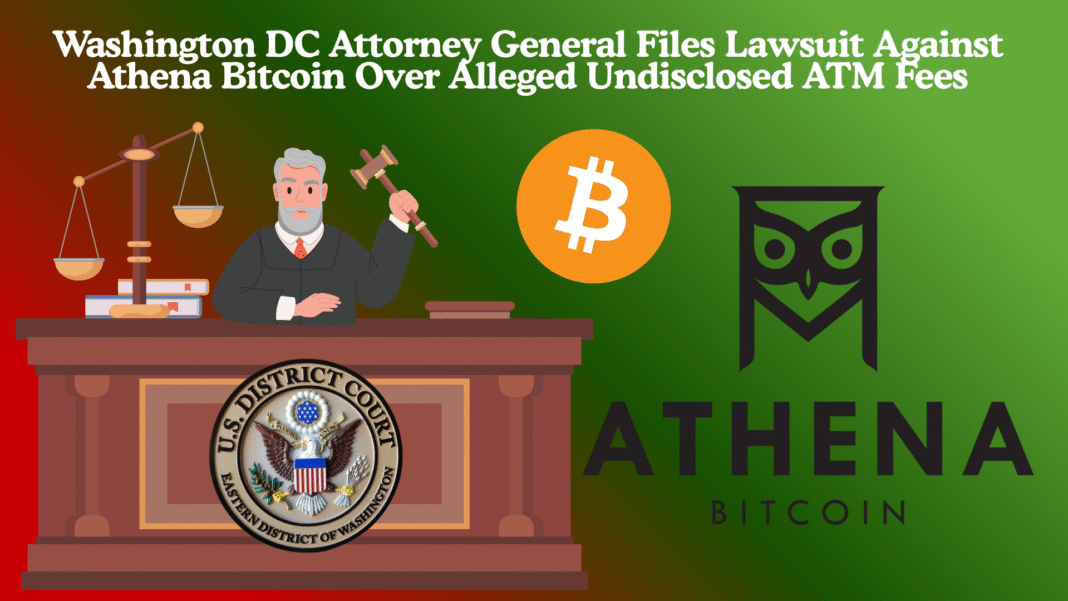The Attorney General’s office in Washington, D.C. has sued Athena Bitcoin, a crypto ATM operator, claiming that it has not disclosed fees and has allowed its machines to be exploited by scammers.
Attorney General Brian Schwalb alleged that in the company’s first five months of operating in D.C., an estimated 93% of all deposits at Athena Bitcoin ATMs were clearly connected to scams.
Schwalb said that Athena’s no-refund policy prevents victims from recovering both undisclosed transaction fees and scam losses.
He said bluntly that “Athena knows that its machines are being used exclusively by scammers while it simultaneously chooses to look the other way so that it can continue to pocket millions in undisclosed transaction fees.”
Fraud Complaints Fuel Crackdown on Crypto ATMs Nationwide
The lawsuit against Athena comes amid a greater scrutiny of the crypto ATM sector, which has become a rampant sector for fraud claims.
As of 2024, the FBI received nearly 11,000 fraud claims regarding crypto ATMs, with total losses exceeding $246 million.
In response, thirteen states, including Arizona, Colorado, and Michigan, have proposed transaction limitations on Crypto ATMs, mainly to mitigate the financial exploitation risks.
Additionally, the lawsuit highlights an increasingly politically charged concern regarding a lack of oversight when operators, such as Athena, allegedly focus on profits over consumer safety.
Also Read: Texas Judge Supports Logan Paul’s Attempt To Dismiss CryptoZoo Lawsuit, Here’s Why
Allegations of Hidden Fees and Exploiting Vulnerable Victims
Court filings contend that Athena charged consumers transaction fees upwards of 26% without properly disclosing those fees.
Instead, there is a vague reference to a “Transaction Service Margin” in its Terms of Service, avoiding the term “fee.”
The DC Attorney General accused Athena of deceptive and unfair trade practices and violating statutes intended to protect elderly and vulnerable adults from financial exploitation.
Schwalb’s office asserts that Athena “made hundreds of thousands of dollars” off of undisclosed fees between May and September of 2024, where particularly many of the victims were older residents.
The average victim was 71 years old, while they suffered an average loss of $8,000 per transaction. One DC resident claimed to lose $98,000 after a scam with an Athena ATM.
Also Read: Binance Co-Founder CZ Requests Court to Dismiss $1.76 Billion Clawback Lawsuit Filed by FTX Estate
Consumer Protection and Warnings Against ATM-Related Scams
Schwalb noted that Athena’s “poor oversight” has created “a pathway for committing illicit international fraud that is virtually unimpeded,” giving scammers a way to intimidate, confuse, or in some other way compel victims to deposit their whole savings.
To avoid making victims out of lots of individuals, consumers are cautioned to never send money to a person they do not know in real life, especially a stranger contacting them randomly and offering a financial opportunity.
Scammers routinely impersonate crypto-support technicians or promise absurd rates of return, warnings that defrauded individuals take very seriously when it happens to them.
Experts suggest verifying suspicious communication via a legitimate, verifiable source, and that consumers should resist requests for payment if the payment mechanisms are not verifiable.
Currently, there are 26,850 crypto ATMs in the US, with Bitcoin Depot having the largest share at 27.6% of the total market. CoinFlip and Athena share the next most significant market interests, of 13.6% and 13%, respectively.
Rising Global Cases Highlight Urgency of Regulation
The case against Athena is just one example of a growing number of cases of fraud against crypto ATMs in numerous locations around the world.
On March 1st, a UK individual named Osunkoya received a 4-year sentence for illegally managing a crypto ATM network after the Financial Conduct Authority rejected his registration application, according to UnoCrypto.
Also, we reported that an Arizona resident Vincent Mazzotta Jr. pleaded guilty to running a $13 million Ponzi scheme that used fake AI trading bots.
He was also involved in a second “business” that scammed his previous Ponzi victims by pretending to be a government-backed recovery service for cryptocurrency.
Recent situations like this, along with scandals regarding undisclosed fees in traditional commercial banks, show why we need proper oversight and regulations of financial institutions and cryptocurrency-related businesses to protect consumers from deceitful schemes.


